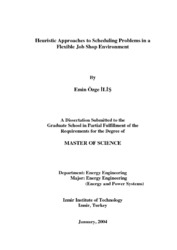Please use this identifier to cite or link to this item:
https://hdl.handle.net/11147/3768| Title: | Heuristic approaches to scheduling problems in a flexible job shop environment | Authors: | İliş, Emin Özge | Advisors: | Örnek, M. Arslan | Publisher: | Izmir Institute of Technology Izmir Institute of Technology |
Abstract: | Modern production factories, to obtain high profits, usually maximize their profits through streamlining their productivity. This goal can be achieved, among others, by optimal or almost optimal scheduling of jobs in production process. Scheduling is a key factor for manufacturing productivity and energy save. Effective scheduling can improve on-time delivery of products, reduce inventory, reduce processing times, and utilize bottleneck resources, therefore energy is saved as a result.Process plants typically produce a family of related products that require similar processing techniques. The most important problem encountered in such manufacturing systems is scheduling of operations so that demand is fulfilled within a pre-described time horizon imposed by production planning. The typical scheduling operation that process plants involve can be formulated as a general job shop scheduling problem. Due to production flexibility, it is possible to generate many feasible process plans for each job. The two functions, process planning and scheduling are tightly interwoven with each other. The optimality of scheduling depends on the result of process planning. The integration of process planning and scheduling is therefore important for an efficient utilization of manufacturing resources.In this study, we present real cases taken from manufacturing industry, which were modeled and solved using theoretical tools of scheduling theory. According to this idea, this study was motivated by the design and implementation of a flexible job shop scheduling system for the manufacturing of Teba Oven.s Press Workshop.The manufacturing is characterized by significant machine setup times, strict local capacities, the option of choosing a few alternative processing routes, and long horizon as compared to the time resolution required by the scheduling models. Our goal is thus to obtain near-optimal schedules with quantifiable quality in computationally efficient manner. For achieving this goal, dispatching rules and shifting bottleneck heuristics are used, and solution methodology based on a combined dynamic programming. The methods have been implemented by using the object-oriented generic programming, LEKIN [43], and the outputs show that the methods generate high-quality schedules in a timely fashion to achieve on-time delivery of products and low in work-in-process inventory. Finally, the integrated treatment of machines and buffers facilitates the smooth flow of parts through the system. | Description: | Thesis (Master)--Izmir Institute of Technology, Energy Engineering, Izmir, 2004 Includes bibliographical references (leaves: 81-85) Text in English, Abstract: Turkish and English x, 85 pages, [245] leaves |
URI: | http://hdl.handle.net/11147/3768 |
| Appears in Collections: | Master Degree / Yüksek Lisans Tezleri |
Files in This Item:
| File | Description | Size | Format | |
|---|---|---|---|---|
| T000264.pdf | MasterThesis | 3.21 MB | Adobe PDF |  View/Open |
CORE Recommender
Page view(s)
68
checked on Apr 15, 2024
Download(s)
94
checked on Apr 15, 2024
Google ScholarTM
Check
Items in GCRIS Repository are protected by copyright, with all rights reserved, unless otherwise indicated.